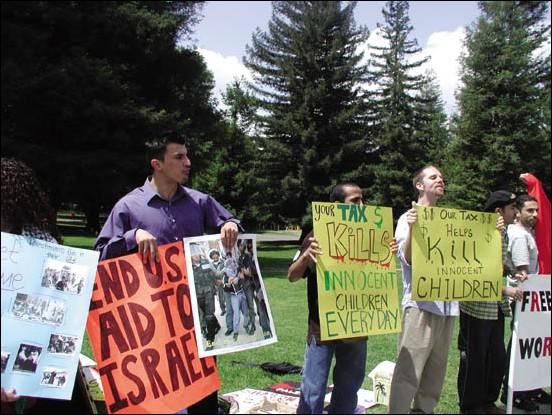Students argue both sides of Mid East conflict

Image: Students argue both sides of Mid East conflict:Pro-Palestinian students in the Quad hold up signs protesting U.S. policies. Photo by Natalie Morris/State Hornet:
May 8, 2002
Sharp disagreements tempered with civility characterized two days of impassioned Sacramento State demonstrations over America?s Middle East policy last week.
Approximately 40 to 50 protestors lined the walkway of the library quad on Wednesday and Thursday, carrying signs and chanting slogans accusing Israel of perpetuating violence against innocent Palestinians.
The demonstrators pointed to United States president George W. Bush as an obstruction to the peace process.
“Our tax dollars help kill innocent children,” read one poster.
“Even though we are students in America, we are in solidarity with the Palestinian people,” said Nina Shoman, president of Students for Justice in Palestine.
“Change the Zionist, racist policy of Israel, and you will have peace,” Shoman said.
From an information booth directly across the quad, a small contingent of Israeli supporters quietly contested the assertions of the pro-Palestinian demonstrators.
Julie Rehman, president of the Sac State Jewish Student Union, said that Israelis are merely trying to defend themselves from terrorism, just as any country would do in similar circumstances.
“The military is in a reactive mode,” Rehman said. “We can?t even discuss peace until we reach normalized relations.”
Shoman said that the people who are being referred to as “terrorists” or “suicide bombers,” are in fact martyrs for Palestinian freedom and have no other way to resist Israeli aggression.
Palestinians are up against Apache helicopters and tanks demolishing residential areas, preventing pregnant women and wounded people from receiving medical attention, Shoman said.
“You can?t expect them to react in any other way,” she said.
Two young women from Israel, Tamar Fogel and Oshrit Shriki, came to the United States eight months ago to work with the local Jewish community as part of their service in the Israeli military.
They urged supporters of Israel to stand up for what they believe in.
“Every Jew or any person in the world that feels a connection with Israel should come and help our cause,” Fogel said.
“The world is turning against Israel because of the media,” Shriki said.
Fogel said the accusatory tactics being used by the Palestinian protestors were distorting the truth and damaging the peace process.
“Do you fight, or do you compromise?” Shriki asked.
The protestors carried signs and chanted slogans charging Israeli Prime Minister Ariel Sharon with committing atrocities equal to those committed by Adolf Hitler during the holocaust.
“All of the things that are happening in Palestine happened in the Holocaust,” said Basma Marmosh, a representative of Students for Justice in Palestine.
“The simplest way to communicate to people who aren?t familiar with the situation is to show them something they already know,” she said.
Marmosh said the comparison with the Holocaust is aimed at the policies of Sharon and the Israeli government, not toward Jewish people.
As a Jewish citizen of Israel, Fogel did not see it this way.
“I feel pain when I see that message,” she said. “My family survived the Holocaust, and I am being accused of harming people in the same way?”
“The world should move on,” Fogel said.
Both sides agreed that the Israel- Palestine conflict went beyond religious differences.
“This is not just for Palestinians but for everyone fighting oppression,” Shoman said.
Ahjamu Umi, a Sac State graduate student in government, joined the pro-Palestinian protestors as a representative of the All-African Peoples Liberation Party.
“Religion has nothing to do with it,” he said. “This is a political movement.”
Steven Trop, a Jewish student majoring in history, said that both sides were wrong.
“Just come to the negotiating table and agree on something,” he said.
Though disagreements persisted, the atmosphere filling the gap between the two groups was one of curiosity rather than hostility.
“I want to hear both sides,” said sophomore Kisha Clark after walking from the Palestinian side to speak with members of the Jewish Student Union.
Though she supports the Palestinian cause, Clark welcomed the opportunity to speak openly with the pro-Israel group without fear of confrontation.
“It?s cool the way they?re going about this,” she said.
Student Activities Director Lou Camera fully supports the efforts of both groups.
Send comments, questions, or concerns to [email protected]
For questions or information regarding thesite, please contact [email protected]













































































































































